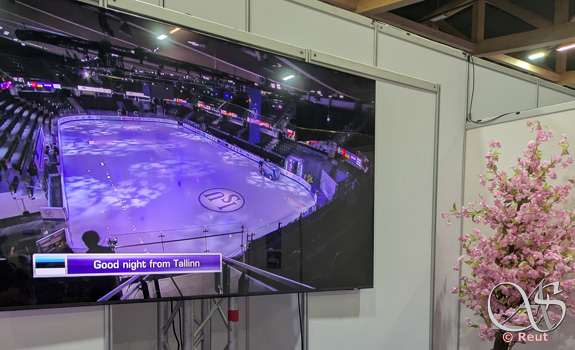2025 Euros tidbits
March 8, 2025
By Reut Golinsky
Photo © Reut Golinsky
As we start building anticipation for the World Championships 2025 in Boston, here is our final look back at the Europeans 2025: the highlights, the personalities, the stories, and the memories we will take from Tallinn.
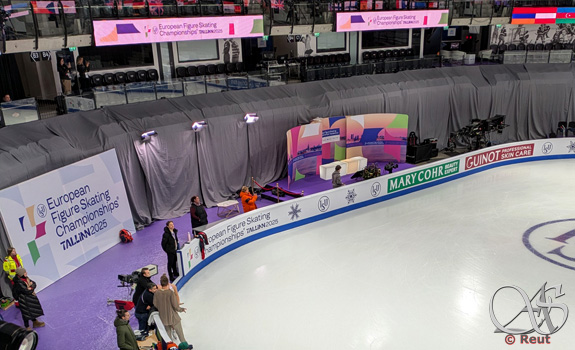
Matteo Rizzo is 100% back
It's great to have Matteo Rizzo back at the Europeans, healthier and stronger than last year.
"I feel really well, 100% back," he assured us during the official practice day. "Last year during the Europeans, I was not at 100%. Now, I feel at full strength, and I'm very happy about it.
The beginning of the season was a significant milestone for me, returning to the ice after surgery and competing - that was a big step, but everything went smoothly. Overall, I feel that the season has gone very well. Of course, there were a few mistakes here and there in the Grand Prix, and I made a major one at the Italian Nationals, but things like that can happen. I'm very happy to be here, in good shape, with a great team behind me, and I will try to perform to the best of my ability."
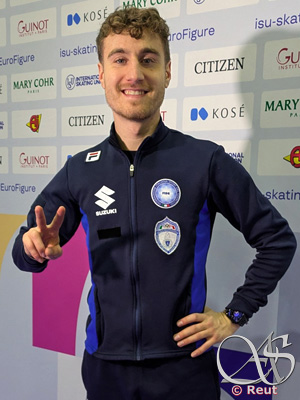 The initial plan was to keep both programs, "Two Men in Love" for the short program and "Fix You" for the free skate, from last season, but Matteo has prepared a special treat for us.
The initial plan was to keep both programs, "Two Men in Love" for the short program and "Fix You" for the free skate, from last season, but Matteo has prepared a special treat for us.
"I changed my free skate, and it's going to be a little surprise for the audience. It's one of my favorite programs I've ever done in my career. I'm very happy to perform this piece, and I really look forward to it. The program is to 'Miserere,' performed by Luciano Pavarotti and Zucchero. It's a very important song. I've wanted to skate to this music for a few years, but I didn't feel mature enough to do so until now. This program is very Italian, and I feel it's important to try it because the next season will be significant for us, and everyone will have at least one Italian program.
As for 'Fix You,' it was just the end of the program. I believe that each program has its beginning and end; it's natural, and I feel a new energy coming up. Luca Lanotte choreographed both of them, and I think we have a strong partnership. Likewise, I have also worked well [on the short program] with my other choreographer, Massimo Scalli. I've had great collaborations with both of them."
Daniel Grassl and Nikolaj Memola will represent Italy at the World Championships later this month, so unfortunately, we won't see Matteo in Boston. But the crucial time to be part of the team will be next season when tickets to the home Olympics will be decided, and the competition will no doubt be fierce.
Josefin Taljegård: focusing on her strengths
Josefin Taljegård is one of those skaters who definitely has her own style and charisma. In her recent Instagram post, she mentioned a "discussion about why we love skating, what makes us want to watch a skater, what my strengths are, and how I can make my performances unique." So, we asked her to elaborate.
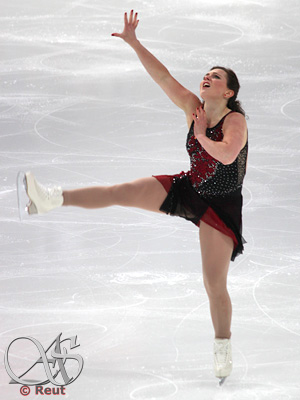 "Sometimes I fall into the trap of constantly thinking about: What do the judges want? How many rockers can I fit into this step sequence? Those kinds of thoughts. Of course, I want to get all the levels on my elements, but I also need to feel confident in my own skating, to say: 'Okay, this is what I have to offer. If you like it, then that's great; but this is what I want to present.' Having that confidence can, I believe, create charisma in a way that makes people want to watch, rather than seeing someone trying to cram as much as possible into the program without any feeling or reason for doing it.
"Sometimes I fall into the trap of constantly thinking about: What do the judges want? How many rockers can I fit into this step sequence? Those kinds of thoughts. Of course, I want to get all the levels on my elements, but I also need to feel confident in my own skating, to say: 'Okay, this is what I have to offer. If you like it, then that's great; but this is what I want to present.' Having that confidence can, I believe, create charisma in a way that makes people want to watch, rather than seeing someone trying to cram as much as possible into the program without any feeling or reason for doing it.
So, we've been working on being present in the moment while I'm performing my choreography. Instead of trying to look at the judges while wondering whether they like this transition, I want to focus on what I'm doing with my arms and legs.
In the end, you don't have to think about what everyone else is thinking about you. I know that I may sometimes come off as very self-confident, and in some ways I am, but it's also something I'm continuously working on. I wasn't born with it, you know. As a woman in this sport at my age and of a certain size, I often have to fight against prejudice. However, I try to focus on what I can do that would make me want to skate."
This theme of focusing on what Josefin loves and knows best in her skating continued when we talked about her "Wicked Game" short program.
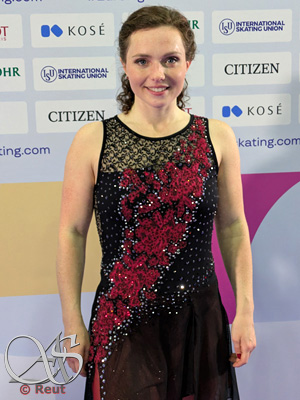 "I've had this program for the second season now. Indeed, I've done many different things and have always come up with something unique, but I hadn't worked in this style before. I was always a bit afraid to try it because everyone told me that if I wanted to skate to a slow song, I needed to have big spirals, adopt a different style, and essentially look more like a ballerina. I know that this may not be my strong suit, so I needed to focus on my strengths.
"I've had this program for the second season now. Indeed, I've done many different things and have always come up with something unique, but I hadn't worked in this style before. I was always a bit afraid to try it because everyone told me that if I wanted to skate to a slow song, I needed to have big spirals, adopt a different style, and essentially look more like a ballerina. I know that this may not be my strong suit, so I needed to focus on my strengths.
We found a more acting-based approach, which is something I've studied as well, and we tried to incorporate that into the program. I'm happy to be skating this program now as a mature woman, rather than when I was fourteen. I believe my program now is very different from what it would have been back then; that's for sure."
Unfortunately, despite her repeated efforts and participation in both the Road to 26 and the Bellu Memorial, Josefin came up short of earning the needed Combined Total Element Scores to compete at Worlds. She will need to try to secure one of the remaining spots during the ISU Qualifying Competition in Beijing next season.
Phebe Bekker and James Hernandez: taking the positives out of a challenging season
Two-time ISU Junior GP silver medallists from Great Britain ended 2024 on a high note by winning the Golden Spin Challenger.
 "It was probably the highlight of our skating career," they shared. "We knew we had the ability to do well, but this time we were really rewarded, and it felt like all of our hard work paid off. We went into the free dance without thinking about placements - just focusing on showing our very best. It was nice to have this experience, especially competing against teams we had never come out on top of before, and with everyone skating really well. So it was really rewarding for us, and we're hoping to take that momentum into the new year."
"It was probably the highlight of our skating career," they shared. "We knew we had the ability to do well, but this time we were really rewarded, and it felt like all of our hard work paid off. We went into the free dance without thinking about placements - just focusing on showing our very best. It was nice to have this experience, especially competing against teams we had never come out on top of before, and with everyone skating really well. So it was really rewarding for us, and we're hoping to take that momentum into the new year."
Due to logistical issues, the team spent most of the first half of their season in Milan:
"With so many competitions in Europe and the delay in getting Phebe's visa, we decided to stay in Milan for a little while. It was an interesting season to get used to, we had to live out of suitcases for six weeks at a time, hopping between different Airbnbs - madness! But we made it work and really took the positives out of it.
Nick (Buckland) and Luca (Lanotte) have known each other and competed alongside each other for ages, so we trained with Luca's teams, and he was just amazing as a coach. He's in Tallinn, too, and it's great that we can see him, joke around, and have a laugh. It wasn't meant to go on as long as it did, but in the end, everything was fine as we got back to Nick and our coaching team before Europeans. We love Milan, it's been great, but we're very happy to be back in our training environment."
This season, the team went fully British with their music choices. "We didn't mean for both our programs to be British," they explained. "It just worked out that way. 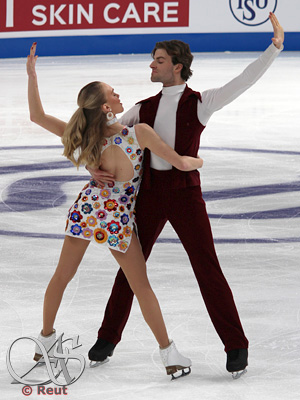 We chose our free dance first-we loved the 'Final Ascent' piece from 'No Time To Die.' We watched it in the cinema and independently thought, 'That's a song you need to put on the ice!'
We chose our free dance first-we loved the 'Final Ascent' piece from 'No Time To Die.' We watched it in the cinema and independently thought, 'That's a song you need to put on the ice!'
Then we started looking at all the different styles for the rhythm dance. We really didn't want to pick disco. We went through loads of disco tracks and said, 'Everyone is going to do this!' So we started thinking: what are the other dances? Twist? And then our first reaction was, 'Twist and Shout!' Our music editor, who is also British, is a big 'Beatles' fan."
Choosing the most popular songs in the world guarantees that the audience will sing along. "Here it was the first time we've skated this program in front of a big crowd. At some point, it got really loud, and I think I lost track of the music!" James admitted.
We have no doubt that the audience in Boston will have an enthusiastic sing-along during Phebe and James's rhythm dance.
Ioulia Chtchetinina and Michał Woźniak Wozniak: exceeding expectations
This relatively new pair - only in their second season together - has an interesting, complex, and inspiring story.
Michał Woźniak was a single skater until 2019 and never competed internationally. He teamed up with his first partner, Anna Hernik, in 2020, and both were new to pair skating. However, their partnership was short-lived, as they competed together in only one international event, the Nebelhorn Trophy 2021.
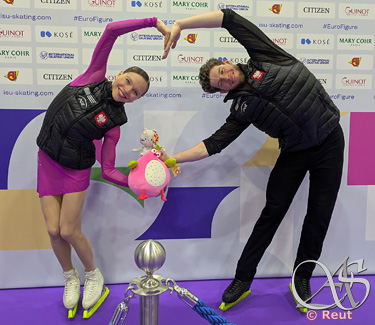 Ioulia Chtchetinina, on the other hand, is a three-time Hungarian national champion with Márk Magyar, her third partner after Scherer and Akulov, with whom she competed for Switzerland. Their highest placement with Márk was 6th at the Europeans 2022. They qualified for the 2022 Beijing Olympics and had many plans for what to do and see there. Unfortunately, upon arrival, Márk received an unclear result for his PCR test from the airport, later followed by an additional positive test.
Ioulia Chtchetinina, on the other hand, is a three-time Hungarian national champion with Márk Magyar, her third partner after Scherer and Akulov, with whom she competed for Switzerland. Their highest placement with Márk was 6th at the Europeans 2022. They qualified for the 2022 Beijing Olympics and had many plans for what to do and see there. Unfortunately, upon arrival, Márk received an unclear result for his PCR test from the airport, later followed by an additional positive test.
Following Ioulia's announcement about parting ways with Magyar, Michał reached out to her. Despite differences in their skill levels and experience in pairs, Ioulia agreed to a tryout, and their partnership was officially announced in August 2023. In their first season together, they earned silver at the 2023 Diamond Spin, bronze at the 2023 Warsaw Cup, silver at the 2024 Bavarian Open, and achieved a top-ten finish at the Europeans. In the mixed zone in Kaunas, Ioulia was particularly excited about competing in Montreal, as she, like everyone else, missed the opportunity to compete at Worlds 2020 there due to COVID.
This season, they were assigned to compete at Skate Canada following the withdrawal of Beccari/Guarise and later received their second Grand Prix invitation, to China. They finished sixth and fourth, respectively - quite an impressive result for their first Grand Prix circuit together. They capped off 2024 by winning gold at the Golden Spin.
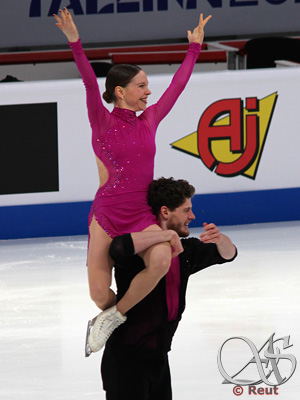 The happiness they radiate on the ice - showing how much they truly appreciate the opportunity to skate and compete - is contagious. They are also bubbly and fun to talk to in the mixed zone.
The happiness they radiate on the ice - showing how much they truly appreciate the opportunity to skate and compete - is contagious. They are also bubbly and fun to talk to in the mixed zone.
"Last year, we came in without any expectations. We were a new team, and everything was just a bonus. But this year, we already had some! Now, after such a good first half of the season and demonstrating solid skating, it's not even the pressure from outside; it's just that you don't want to drop below a certain level. Even though you've shown consistent skating in practices and previous competitions, sometimes, when you're standing there, you have those pesky little thoughts: 'What if I don't do it now?' So we're glad we executed all the elements as well as we could."
The team is coached by Dmitri Savin and Nolan Seegert, Minerva Hase's former partner, and they have a lot of praise for him. "We think he is doing an amazing job. He has all the best qualities of a coach because he genuinely likes to work, and he loves skating. We have good chemistry; he likes us as people, too. It's fun and easy, and at the same time, he is very structured and prepared. He is organized, but we can also take it easy and have fun together. We also appreciate that he is not afraid to learn from other coaches - and from us. If we say we like or don't like something, or if we prefer things differently, he listens. He is a highly skilled specialist, with vast knowledge of exercises and small details, and he always puts that knowledge to good use. He understands us and knows what works best for us, and he always keeps our perspective in mind."
When we caught up with Nolan afterwards and mentioned that he was especially praised for being structured and organised, he laughed: "That's probably the inner German in me!"
 Nolan, who completed his bachelor's degree in sports and biology last September, is now in his first semester of a master's program while coaching full-time. In addition to working with Ioulia and Michal, he also coaches the junior German pair Katalin Janne Salatzki and Lukas Roeseler, with more pairs joining from time to time - sometimes he has up to four pairs at once.
Nolan, who completed his bachelor's degree in sports and biology last September, is now in his first semester of a master's program while coaching full-time. In addition to working with Ioulia and Michal, he also coaches the junior German pair Katalin Janne Salatzki and Lukas Roeseler, with more pairs joining from time to time - sometimes he has up to four pairs at once.
Overall, he was pleased with his students: "I'd say they did pretty well. It was close to their season's best, and they showed everything they can do. More than that was not possible at the moment. Every competition this season, they're just showing what they can do - 10% better or worse - but they're never dropping below a certain threshold, never making that many mistakes. Maybe also because they have slightly easier content and aren't going for all the difficult stuff yet."
As for potential changes ahead of Worlds, he doesn't anticipate any major ones: "It's more about stable skates and getting the quota for the Olympic Games. So we need to refine what's already there and make it even cleaner."
Deniss Vasiļjevs: exploring the world beyond skating
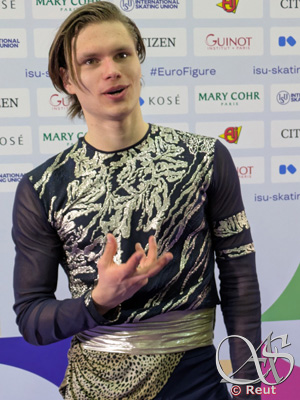 As a follow-up to our interview with Deniss from Worlds in Montreal, we asked him whether he succeeded in "just being a normal guy" during the off-season, as he had planned. His answer, as one might expect from the philosopher he is, was much deeper.
As a follow-up to our interview with Deniss from Worlds in Montreal, we asked him whether he succeeded in "just being a normal guy" during the off-season, as he had planned. His answer, as one might expect from the philosopher he is, was much deeper.
"Now, I've started exploring the world beyond skating much more. Whether I wish it or not, at least for now, it will always be a challenge for me not to judge it through my sporting experience and the lessons I've learned in this 'greenhouse' of figure skating. For me, sport is more than just performance - it embodies values and virtues. But the real world is less like this beautiful 'greenhouse' and more like a 'wilderness.'
I think I'm slowly integrating into normal life - the kind with actual dates and weekdays, rather than just 'work day,' 'day off,' or 'how many days until the next event.' Even though I studied, I never really took part in social activities - I was mostly swamped, always having to deliver on short notice. There wasn't much room for adventure. But now, after earning my degree, I'm experiencing things differently. I'm far more open to the world and much more observant. I'm learning how to balance it with skating, and I think I'm doing a good job."
As he mentioned his studies, we also asked him to elaborate further on his research and what he learned from it:
"One of the conclusions from my research was that rules don't apply to every situation - you should focus more on intention. The goal should be to create an intention that drives positive change, rather than just setting rules: 'Do it like this, do it like that.' You have to think differently! Change begins with mindset.  You need to broaden horizons, encourage initiative, and have a vision. Recognize talent and help it shine by nurturing innate abilities. It's about being a catalyst for better performance collectively, as a society.
You need to broaden horizons, encourage initiative, and have a vision. Recognize talent and help it shine by nurturing innate abilities. It's about being a catalyst for better performance collectively, as a society.
To think outside the box, you first need to understand the box. Rules form that box, but intention is what allows room to manoeuvre. Leadership is about making things better - having a vision and persevering in that direction while solving problems along the way. It's not about saying, 'I know everything, just do what I tell you.' It's about education, about helping people become the best versions of themselves. And I didn't always see it that way. At one point, I was busy creating a box - until I realised that no box can truly contain a person."
Deniss received an enthusiastic response from the crowd - second only to that of gold medalist and home favorite Niina Petrõkina - and, echoing his own words, "won the flags' competition" with the help of his fans. Yet, the organizers made a puzzling decision not to invite him to the gala. We sincerely hope this oversight won't occur at Worlds.
Evgeniia Lopareva and Geoffrey Brissaud: in their season to shine
Even though they've been around for a while - they teamed up in 2018 and debuted at the senior level the following year - and have always had a distinctive style that sets them apart, this is their first season being truly noticed as contenders for podium finishes at major competitions.
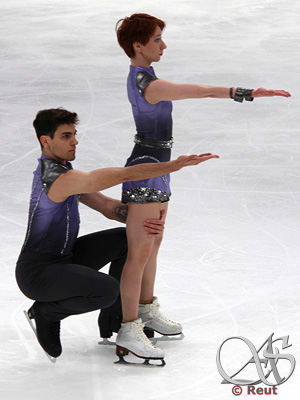 "We improved a lot this season," Geoffrey admitted. "We worked hard on the quality of what we do, and step by step we're growing and will continue in this way. The progress started at the end of last season, I think. We felt much more confident and connected. It's starting to grow, and we can feel it. The scores are going up, too."
"We improved a lot this season," Geoffrey admitted. "We worked hard on the quality of what we do, and step by step we're growing and will continue in this way. The progress started at the end of last season, I think. We felt much more confident and connected. It's starting to grow, and we can feel it. The scores are going up, too."
The team made their season debut at the 2024 Shanghai Trophy, where they earned a silver medal. They then competed on the Grand Prix circuit, finishing with a bronze medal at Skate Canada and achieving a surprise victory at the Grand Prix de France, which qualified them for the Grand Prix Final for the first time in their careers - and not just any Final, but one held at home.
"It's the best way to enter into the top tier," Geoffrey said in Grenoble. "We are with our public, and it pushes us to perform." "That's so cool!" Evgeniia added. "We definitely feel the support of the French audience for us, so it helps a lot in this competition. Maybe in another country, we might have felt more stress because it's our first Final, but at home, it just feels great."
During the press conference held by the French team before the competition, both skaters were clear about their goal for the season: to podium in Tallinn. "Yes, we thought about the possibility of qualifying for the Final, but our main goal for this season is a European medal," they said. They sounded very confident that their goal was achievable, even though it wasn't guaranteed at that point, as at least three other teams from Finland, Lithuania, and Spain were also eyeing the European bronze. Achieving a silver rather than a bronze in the end was an unexpected and pleasant surprise. "We fought for three years to get a European medal; we were determined to get it this year. Getting silver instead of bronze was unexpected - it's even cooler, and we're super happy! We worked hard for this to happen; we could not imagine that it would come true, and then it did. Our first European medal! It's like a child's dream realized."
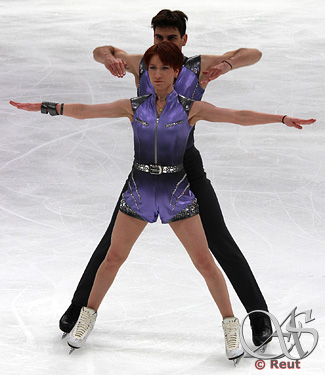 Another bold goal discussed during the French team's press conference in Grenoble was winning an Olympic medal at the home Olympics in 2030. "Of course, when we heard the news that the 2023 Winter Games are going to be in France, we were super excited. And, of course, our goal will be more than just to participate there; it's to finish on the podium. Every time we perform in France, it's an amazing experience. The support of the French public is just incredible, so competing at the Olympic Games in France will be an experience of a lifetime!" Evgeniia said. "These will hopefully be our second Games, and we will be looking to finish our careers with an Olympic medal. But the first step before that is the Games in Milan," Geoffrey concluded.
Another bold goal discussed during the French team's press conference in Grenoble was winning an Olympic medal at the home Olympics in 2030. "Of course, when we heard the news that the 2023 Winter Games are going to be in France, we were super excited. And, of course, our goal will be more than just to participate there; it's to finish on the podium. Every time we perform in France, it's an amazing experience. The support of the French public is just incredible, so competing at the Olympic Games in France will be an experience of a lifetime!" Evgeniia said. "These will hopefully be our second Games, and we will be looking to finish our careers with an Olympic medal. But the first step before that is the Games in Milan," Geoffrey concluded.
"Before going into the free dance today, we told each other that no matter what the result is, it will not change anything in our process afterward - we will go back to our ice rink and keep working hard," Evgeniia clarified during the press conference in Tallinn. It's a great attitude, and it's something they will need even more now.
With the recent announcement from Laurence Fournier Beaudry and Guillaume Cizeron, who will team up to represent France starting next season, and the French federation clearly marking them as their favourites, it remains to be seen how this will impact Lopareva and Brissaud's progress and plans. They are original and different; they are fighters, and they have tasted success as an elite team. It won't be easy, and we want to wish them luck. Their first step will be to secure the highest placement in Boston and maximize the number of spots for France in ice dance, as they may really need as many as possible next season.
Facts and figures
A total of 161 skaters from 34 ISU members were entered for the 116th edition of the ISU European Championships,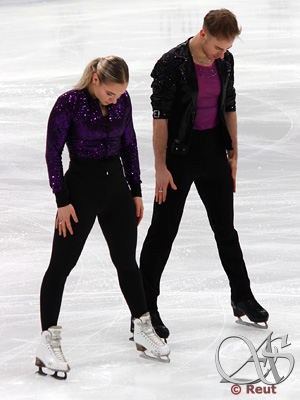 with 37-year-old Valtter Virtanen being the oldest skater competing and 17-year-old Daniel Korabelnik being the youngest.
with 37-year-old Valtter Virtanen being the oldest skater competing and 17-year-old Daniel Korabelnik being the youngest.
There were five pairs of siblings competing at the championships: Natalie Taschlerova/Filip Taschler and Katerina Mrazkova/Daniel Mrazek in ice dance; Greta Crafoord/John Crafoord in pairs; Sophia Schaller and Flora Marie Schaller in pairs and women's events; and Aleksandr and Mihhail Selevko competing in men's. Additionally, there were two husband-and-wife teams: Camille Kovalev/Pavel Kovalev in pairs and Diana Davis/Gleb Smolkin in ice dance.
Two countries were represented for the first time in new disciplines: Iceland in pairs with Júlía Sylvía Gunnarsdóttir/Manuel Piazza and Romania in ice dance with Emilia Monika Ziobrowska/Shiloh Douglas Judd.
Tallinn welcomed the ISU European Figure Skating Championships for the third time, following 2010 and 2022. In 2022, due to the COVID-19 pandemic and China's withdrawal as host, along with the lack of volunteers from other non-European members, it also hosted the Four Continents Championships, making it the only European city to do so in ISU history. This year's Europeans marked another instance of Tallinn stepping in after the Croatian Skating Federation withdrew from hosting this event in Zagreb.
The Tondiraba Ice Hall - one of the most comfortable ice arenas to work in - also hosts the annual Tallinn Trophy, which is part of the ISU Challenger series in some years, and will welcome Estonia's fourth Junior World Championships next year, following the previous three held in 2015, 2020, and 2022.
All that being said, Tallinn loves hosting figure skating events, and we love it when it does - hopefully, there will be many more to come.
